
Choosing my favorite albums fronted by J. Robbins* has never been difficult—Jawbox’s For Your Own Special Sweetheart, Burning Airlines’ Mission: Control!, and Jawbox in that order—but choosing ten favorite songs from the D.C. great is a harrowing proposition. Robbins has penned a towering stack of remarkable tracks in the twenty-two years since striking out on his own after the demise of Government Issue. With seven full-lengths, plus a slew of EPs, singles, and compilation appearances to choose from, there are plenty of candidates for this list. Plus, Robbins’ newest group, Office of Future Plans, will release their self-titled debut LP on Dischord in November, likely forcing future revisions.
So why J. Robbins? All of his bands—Jawbox, Burning Airlines, Channels, and now Office of Future Plans—epitomize what I love about D.C. post-hardcore/post-punk: tricky guitar parts, rhythmic complexity, and passionate delivery. But what sets Robbins apart is his voice. In the literal sense, it’s melodic but approachable, strong-willed yet compassionate. I use Robbins’ voice as the barometer for a legion of like-minded late ’90s / early ’00s guitar-rock vocalists**: it never devolves into monotone post-hardcore shouting, never pushes awkwardly out of the ideal singing-along-in-the-car range. In the figurative sense of voice, Robbins’ lyrics rank among my favorites. His songs are opaque, but never outright inscrutable. Even when there’s a clear topic at hand, there are three or four alternate ways to read it. His songs skew both personal and political; each record echoes its era without being trapped by it. His expanded vocabulary prompted a Jawbox Lexicon to appear on the old DeSoto Records site. In short, his intellectual impulses add resonance and depth to the songs, but never turn listeners away.
J. Robbins is the lone common thread across the four bands he’s fronted, but I would be remiss to ignore his universally excellent collaborators. In case you think I’ve ignored the mammoth contributions of Kim Coletta, Adam Wade, Bill Barbot, Zach Barocas, Peter Moffett, Mike Harbin, Janet Morgan, Darren Zentek, Gordon Withers, and Brooks Harlan, don’t worry, they’ll get their due when I discuss individual songs. Sadly, the logistics of choosing Robbins-penned tracks robs this list of the superlative Barbot-fronted Jawbox song, “Tongues.” It similarly precludes the discussion of covers like Joy Division’s “Something Must Break,” Frank Sinatra’s “I’ve Got You Under My Skin,” Big Boys’ “Sound on Sound,” Echo & the Bunnymen’s “Back of Love,” and The Stranglers’ “Everybody Loves You When You’re Dead.” Another list, perhaps.
These ten songs are presented in chronological order to allow for the general narrative. Before you drop an outraged comment that a particular song wasn’t chosen, let me make an obvious point: Choosing just ten songs from these records was nearly impossible. Making a list of Jawbox songs alone would be difficult. I’ve tried to cover as much ground—stylistically and chronologically—as possible, but my preferences for the aforementioned trio of albums and Robbins’ introspective mid-tempo songs were hard to abandon.
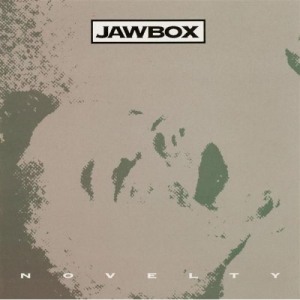
Jawbox, “Dreamless”: There are a handful of worthy songs on Jawbox’s 1991 debut LP, Grippe (“Bullet Park,” “Consolation Prize”), but things got considerably more interesting on its 1992 follow-up Novelty. Bill Barbot joined the group as a second guitarist and vocal foil, which added an essential dynamic to Jawbox’s songs. Managing to be both heavier and more melodic, Novelty represents a quantum leap forward for the group. Although “Static” and “Spit Bite” also merit inclusion, “Dreamless” reigns as my favorite track from this album. It’s a confident merger of the personal and political. Some lines echo Fugazi’s timeless political unrest—“Every minute’s test of our possessions / Leaves us with obsession / That pushes the extreme” (a nod to the Wipers, perhaps?), “Sleep in the nation’s arms is dreamless,” “Clinging to the truth of doctrine so no shots are fired blindly”—but its layered chorus signals something more personal at stake: “Nothing shines in your eyes / Concede my oversight / Blue light burns bright inside / A beautiful disguise.” There’s optimism in Robbins’ portrayal of the system-wearied individual struggling to recognize the potential for reinvention. (Essential note on Novelty: If you don’t already have a copy, make sure you get the remastered version from 2003. The original mix is muddy and unflattering to its source.)
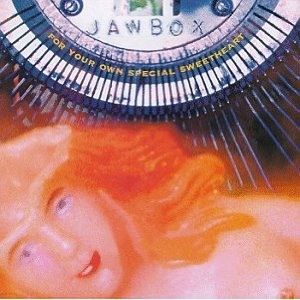
Jawbox, “FF=66”: Jawbox jumped from Dischord to Atlantic for 1994’s For Your Own Special Sweetheart, mirroring the career path of peers Shudder to Think. Like Pony Express Record, FYOSS stands as the biggest achievement in the group’s catalog: a louder, clearer, better statement. FYOSS addresses the major-label jump in its opening salvo. “FF=66” starts with an excerpt of William Carlos Williams reading his 1950 poem: “Seafarers”: “He invites the storm, he / lives by it! instinct / with fears that are not fears / but prickles of ecstasy.” (Full reading here.) I see two primary ways of reading the poem in the context of “FF=66”/FYOSS: first, the “he” is the listener, the invited storm is the music that follows, and the “prickles of ecstasy” are the response to it; second, the “he” is Jawbox, the invited storm is the presumed outcry over leaving Dischord, and the “fears that are not fears” are the ecstatic outlook on this willing future. Either way, it’s an evocative start to the song/album.
Even without its lyrics, “FF=66” would make a huge statement about how Jawbox approached their major-label debut. The razor-wire guitar scrapes, J. Robbins’ barked delivery, Kim Coletta’s swaggering bass line, and new drummer Zach Barocas’s vicious tom work make the aggressive songs on Novelty a quickly forgotten opening act. The melodic chorus slides in seamlessly, betraying zero sense of being shoehorned in by an anxious A&R rep. But those lyrics, specifically “Just want a way not to be what gets sold to me,” present the superior work on FYOSS as way to retain the group’s integrity in the face of that invited storm.
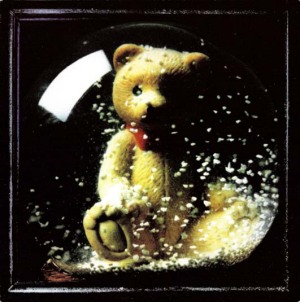
Jawbox, “Savory”: Was there any doubt that “Savory” would make the cut? It’s Jawbox’s most well-known song, having first appeared on a 1993 split single with Edsel, then as the lead single for For Your Own Special Sweetheart, then on Late Night with Conan O’Brien, then as a live cut on the posthumous My Scrapbook of Fatal Accidents compilation, then on Late Night with Jimmy Fallon for the 2009 reunion. Far and the Deftones covered the song. It made an appearance on the inexplicable 1999 K-Tel Nowcore! The Punk Rock Evolution compilation. It made the Pitchfork 500 book and their recent top 200 tracks of the ’90s list. If you’ve heard Jawbox, you’ve heard “Savory.”
What strikes me about “Savory” is how strange it remains, despite potential overexposure. Yes, it’s Jawbox’s most well-known song, yes, it’s arguably their best song, but it’s not a logical, straightforward single. It’s meditative and oblique, filled with droning chords and buried melodies, but its chorus is casually inviting. It offers a cycle of tension and release, but its resolve could merely restart the process. Its lyrics imply divergent topics—the objectification of women, D.C. politics, a manipulative relationship, mutualism—but no reading of the song disavows another. There’s no single stand-out musical performance because they’re all stand-out performances, operating in a closed system of democratic efficiency. Its strangeness is ultimately a sign of its perfection. Few songs gain depth with each successive listen, fewer still retain their initial bewilderment. “Savory” does both.
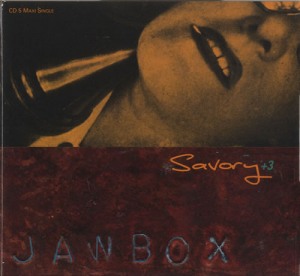
Jawbox, “68”: It’s hard to figure out why “68” was pushed to the Savory EP instead of being included on the otherwise outstanding For Your Own Special Sweetheart. (This injustice was partially rectified when “68” was included as a bonus track on DeSoto/Dischord’s 2009 reissue of the album.) The answer might linger in some fanzine interview from 1994, but since my Jawbox fandom started in 1996, I’ve been at a loss for a specific answer. I have theories, of course—that its melancholic arpeggios would have stood out too much from the distortion of “Motorist” and “LS-MFT,” that its subject matter might have been too personal for wide release, that it didn’t fit into the flow of the album—but none of them justify its banishment to a CD single. In fact, two of those reasons stress why I love “68” so much. Both Robbins’ elongated syllables and those reticent guitars, particularly in the verses, clash with Kim Coletta’s driving bass line, but the song still moves forward with the relentless work ethic evoked in “The paths they’re cut so deep / From thirty years of sleep / Of walking from the quarry to the wall.”
There’s a remarkable lyrical economy to “68,” beginning and ending with “I got the message / Calling me back home.” J. Robbins is too good, too opaque of a lyricist to give a clear-cut picture of what happened, but I’ve always suspected that the song was about a father’s passing. (Jon Mount argues that it’s about Vietnam vets.) The key lines are “And all they try to keep / Is slipping piece by piece / In spite of all attempts at holding on,” which work in so many different contexts, but could easily apply to the family’s support system at home. I listened to the song a number of times and checked the Mission of Burma-inspired alphabetized lyric sheet to make sure that Robbins was saying “they” and not “we” in that line. Regardless of the pronoun or the authorial intent, the lyrics of “68” are simply devastating, just like its musical backing.
On a personal level, “68” now speaks to me like few other songs. I wrote the above two paragraphs sometime in 2009, at which point my father was battling two forms of cancer. He passed away in March of 2010. I can’t hear “I got the message / Calling me back home” without thinking of that phone call. I can’t think of “walking from the quarry to the wall” without thinking of his tireless work ethic, which involved an eighty-minute commute to and from Albany. Jon’s reading of the song as about Vietnam vets reminds me that my father fought in that war and worked to get other vets their proper medical compensation. And I can’t think of “And all they try to keep / Is slipping piece by piece / In spite of all attempts at holding on” without dwelling on how much my father meant to my entire family, and how every member struggles to fill that void. I still recognize that “68” could have been written about something entirely different, but unlike “Savory,” I’ve lost the ability to hear it fresh.

Jawbox, “Absenter”: Jawbox’s self-titled swan-song pulled the group in different directions: more direct (lead single “Mirrorful,” mid-tempo ballad “Iodine”), more rhythm-driven (the Barocas showcases “Won’t Come Off” and “His Only Trade”), more cathartic (“Desert Sea,” “Excandescent”). But its elliptical closer ties these urges together, finding an approachable song amid Barocas’s jazzy snare accents and J. Robbins’ oblique lyrics. Its opening lines—“Entropy’s in / Embroidered on skin / Corrupt, latch-hook thin for show”—have stuck with me as an indirect invitation to a world of J. Robbins’ creation. Based off of its second verse, “Absenter” could have been inspired by yard work or a stray animal, but the end result is a dream-like setting, all evening glimmers and scattered signs. Yet there’s considerable emotion here in “Save a little bit, save it / Send it back to me” and the gang vocals of the repeated title. This balancing act is supported by its cyclical structure, a graceful shifting between gears that could easily continue indefinitely instead of fading out into feedback.
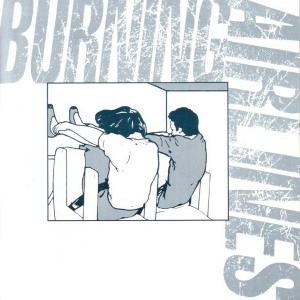
Burning Airlines, “Scissoring”: Burning Airlines’ debut single arrived with considerable anticipation after I mail-ordered it from DeSoto Records in 1998, as it marked one of the first times a favorite group had splintered and then offered a new incarnation. “Carnival” b/w “Scissoring” ended up being the best-case scenario for the post-Jawbox era: two flawless rock songs on one slab of white vinyl that I would play to death until Mission: Control! came out the following year. I could have sworn that the catalog description on DeSoto’s web page read: “One is called ‘Carnival’ and is about a carnival. The other song is called ‘Scissoring’ and is about the French Revolution,” but when I consulted web.archive.org, it says that “Scissoring” is “a post-structuralist reading of the Happy Days episode where Fonzie tries to jump over the barrels on his motorcycle.” I would still like to believe that my memory is accurate and they merely changed the description before that December 1998 crawl.
Those descriptions only reveal the settings of their respective songs. “Carnival” ponders the state of rock music as it transitioned from grunge to alternative to modern rock in the ’90s, while “Scissoring” is a corrupted love song set in the French Revolution. The Mission: Control! version downplays the setting with a subtle shift from “Leave those acolytes on their knees” to “The end of anything so empty,” but I prefer the Reign of Terror overtones of the original take. Stressing the brutal violence of the historical context in that line seems more daring. Both versions have Robbins’ incisive harmonic riff, Bill Barbot’s fluid bass line, and Pete Moffett’s high-hat-heavy bridge, so if you only have the full-length version, you’re just missing those acolytes.

Burning Airlines, “The Escape Engine”: Mission: Control! is J. Robbins’ pop album, hailed with references to his fondness for XTC (along with the band name’s call-back to one of Brian Eno’s weirder pop songs). That comparison isn’t unwarranted—I can hear Drums and Wires and Black Sea in the up-tempo songs—but Mission: Control! doesn’t abandon D.C. post-punk, it just streamlines it. For pure hooks, it’s hard to top “The Escape Engine,” which is accompanied by a brain-burrowing “whee-ooh-wheeee-ooooh” vocal concept from Smart Went Crazy’s Chad Clark. The mammoth chorus of “Make the ending as good as the show / Burn as you go / No connection, no mission control” is ready for repeated drive-time sing-alongs. The irony of these hooks is two-fold: while ostensibly about a space pod plummeting to earth, “The Escape Engine” seems to address the broken relationship between Jawbox and Atlantic, and does so using radio-friendly melodies that A&R reps would drool over.

Burning Airlines, “The Surgeon’s House”: Identikit, Burning Airlines’ second and final LP, offsets its prescient sense of Bush-era and post-9/11 unrest (“The Deluxe War Baby,” “Morricone Dancehall,” “Blind Trial”) with peepholes into J. Robbins’ personal life (mentioning his wife/future Channels bassist Janet Morgan by name in “Tastykake,” the poetic love of “A Song with No Words”). How “The Surgeon’s House” fits into this arrangement is up to a J. Robbins biographer to settle; it could be about the cold relationship between his parents or grandparents, or it could be remarkably inspired fiction about family, memory, and history. Whatever its origins, “The Surgeon’s House” explores novelistic depth in its lyrics and arrangement. Robbins’ careful delivery of “Where did my father find this photograph? / Where is the spite, the narrowed eyes? / She looked so beautiful in black and white” doesn’t reveal the emotional breakthrough, but his guitar work does, turning from empty-hall arpeggios to cathartically crashing chords. There’s no other song quite like “The Surgeon’s House” in J. Robbins’ catalog, but I would welcome another chapter.

Channels, “To the New Mandarins”: Burning Airlines’ Identikit presaged the left’s discontent with the Bush administration, but Channels brought those undercurrents to the surface. I bet Robbins and drummer Darren Zentek’s political outrage was amplified by their gig moonlighting with Vic Bondi’s Report Suspicious Activity, since the direct approach of “To the New Mandarins” and other Channels tracks abandons Robbins’ usual obliqueness. (Regarding RSA, be sure to check out “The Loyal Opposition” from 2008’s Destroy All Evidence, a J. Robbins-fronted track.) I’m of mixed mind on this shift: I typically prefer my political outrage as vague as possible so as not to revisit songs as period pieces, but Channels’ execution makes a strong argument for a change in that policy. It’s a stealthy revelation, one that pushes “Mandarins” past other Channels contenders like “To Mt. Wilson from the Magpie Cage” and “The Licensee.”
“To the New Mandarins” begins with a fearsome foundation of Darren Zentek’s muscular drumming (which recalls his dominant work in Kerosene 454) and J. Robbins seething “Show ’em your Patriot Act!” like a protestor spitting venom on the street. These gut punches are counterbalanced by the song’s melodic touches, especially bassist Janet Morgan’s offset background vocals in the chorus. The specifics of the lyrics may date (“Pranking the homeland hotline / Threat level yellow sunshine”), but its sentiment will come in handy for future administrations.

Office of Future Plans, “Harden Your Heart” I debated not including the first single from J. Robbins’ newest band for one simple reason: it’s the only original song they’ve released to date. But it’s a damn good song that offers plenty of lyrical fodder to discuss where Robbins’ songwriting is twenty years after Novelty.
I hear “Harden Your Heart” as a self-reflective look at J. Robbins’ post-Channels years. “Losing your way / On familiar terrain / Perfecting your mistakes,” “Maybe it isn’t love that keeps you running in place,” “Parading in patterns you swore to break,” “Never let on / Never let in”; virtually every line of “Harden Your Heart” lingers on self-doubt. Is going back to a rock band simply reliving the past? Is Robbins comfortable with exposing his thoughts instead of obscuring them like he did in the past? “Harden Your Heart” asks a big question in its chorus—“Who are you now?”—and answers it with the self-assuring “More than the sum of your doubts.” The chanted title shows how ridiculous the internal opposition sounds when put in context—less an act of oblique poetry, more a stubborn embrace of cowardice.
In order for this self-assurance to ring true, “Harden Your Heart” must be a triumphant reinvigoration of form for Robbins. That’s a more difficult task than you might imagine, since Channels’ two releases were often greeted with “They’re solid, but that’s what we expected” shrugs, even from me. Their execution—the pristine production, the confident, experienced performances, the informed arrangements—would be jaw-dropping from an unknown act, but it was simply more of the same for Robbins. Fortunately, “Harden Your Heart” walks the thin line between mixing things up and playing to its strengths. Robbins and fellow Channels holdover Darren Zentek cede space to the newcomers, with Zentek in particular pulling back from the tom pounding that hammered down Channels songs. Bassist Brooks Harlan lurks in the low-end like Kim Coletta did and adds enthusiastic backing vocals to the chorus. Cellist Gordon Withers finds the best approach for each section, switching between uneasy sawing, stable whole notes, and chugging patterns. The end result recalls the tenor of Channels, the energy of Burning Airlines, and the dynamics of Jawbox without sounding too much like any of them. It is a triumphant reinvigoration of form, one that has me foaming at the mouth for their upcoming LP.
|

